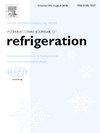喷射器对低温跨临界CO2两级压缩制冷系统性能影响的研究
IF 3.5
2区 工程技术
Q1 ENGINEERING, MECHANICAL
International Journal of Refrigeration-revue Internationale Du Froid
Pub Date : 2025-04-15
DOI:10.1016/j.ijrefrig.2025.04.010
引用次数: 0
摘要
本文介绍了一种制冷实验平台,可以在两级跨临界CO2压缩系统之间切换,有或没有喷射器。通过理论模拟和实验方法,在室内温度为-34 ~ -20℃,气体冷却器压力为8.2 ~ 9.7 MPa,低压电子膨胀阀(EEV)开度为50% ~ 100%的条件下,研究了喷射器对系统性能的影响。研究表明,理论模拟与实验结果不一致的主要原因是压缩机容积效率的理论模型对低压压缩比的变化不敏感,而实际活塞式压缩机对低压压缩比的变化高度敏感。结果还表明,喷射器的应用显著提高了系统的制冷量和性能系数(COP),降低了能耗和碳排放。低压EEV开度的变化对喷射器制冷能力和COP的影响比室内空气温度和气体冷却器压力的影响更显著。在不同条件下,引射器降低系统功耗的能力是相对稳定的。进一步分析表明,喷射器的吸入能力和效率,以及低压压气机的体积效率和等熵效率,对低压EEV开度的变化最为敏感。喷射器的自适应调节可以保持系统单位质量和单位体积制冷量的稳定性。只有将低压EEV开度调整到最佳水平,喷射器才能完全取代高压EEV的功能。本文章由计算机程序翻译,如有差异,请以英文原文为准。
Study on the effect of ejector on the performance of low temperature transcritical CO2 two-stage compression refrigeration system
This paper presents a refrigeration experimental platform that can switch between a two-stage transcritical CO2 compression system with and without an ejector. Through theoretical simulation and experimental methods, the effects of ejector on system performance were investigated under the conditions of indoor temperatures ranging from -34∼-20 °C, gas cooler pressures ranging from 8.2∼9.7 MPa, and low-pressure electronic expansion valve (EEV) openings ranging from 50 %∼100 %. The study reveals that the primary reason for the discrepancy between theoretical simulation and experimental results is that the theoretical model of compressor volumetric efficiency is insensitive to changes in low-pressure compression ratio, while the actual piston compressor is highly sensitive to such changes. The results also demonstrate that the application of ejector significantly enhances system’s refrigeration capacity and coefficient of performance (COP), as well as reduces energy consumption and carbon emissions. The variation of low-pressure EEV opening has a more significant impact on the ejector’s enhancement of refrigeration capacity and COP than indoor air temperature and gas cooler pressure. The ability of ejector to reduce system power consumption is relatively stable under different conditions. Further analysis indicates that the entrainment capability and efficiency of the ejector, as well as the volumetric and isentropic efficiencies of low-pressure compressor, are most sensitive to changes in low-pressure EEV opening. The adaptive regulation of ejector can maintain the stability of system’s refrigeration capacity per unit mass and volume. Only by adjusting low-pressure EEV opening to the optimal level can the ejector fully replace the function of high-pressure EEV.
求助全文
通过发布文献求助,成功后即可免费获取论文全文。
去求助
来源期刊
CiteScore
7.30
自引率
12.80%
发文量
363
审稿时长
3.7 months
期刊介绍:
The International Journal of Refrigeration is published for the International Institute of Refrigeration (IIR) by Elsevier. It is essential reading for all those wishing to keep abreast of research and industrial news in refrigeration, air conditioning and associated fields. This is particularly important in these times of rapid introduction of alternative refrigerants and the emergence of new technology. The journal has published special issues on alternative refrigerants and novel topics in the field of boiling, condensation, heat pumps, food refrigeration, carbon dioxide, ammonia, hydrocarbons, magnetic refrigeration at room temperature, sorptive cooling, phase change materials and slurries, ejector technology, compressors, and solar cooling.
As well as original research papers the International Journal of Refrigeration also includes review articles, papers presented at IIR conferences, short reports and letters describing preliminary results and experimental details, and letters to the Editor on recent areas of discussion and controversy. Other features include forthcoming events, conference reports and book reviews.
Papers are published in either English or French with the IIR news section in both languages.

 求助内容:
求助内容: 应助结果提醒方式:
应助结果提醒方式:


